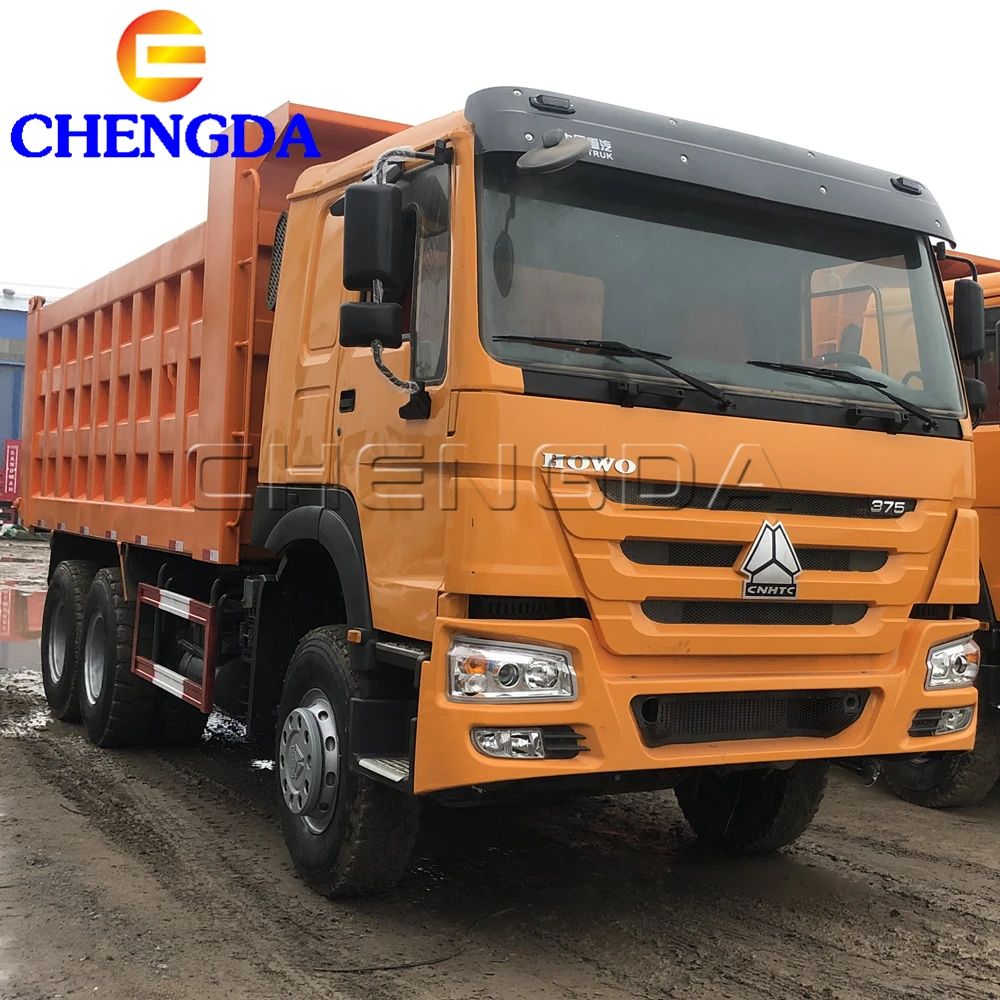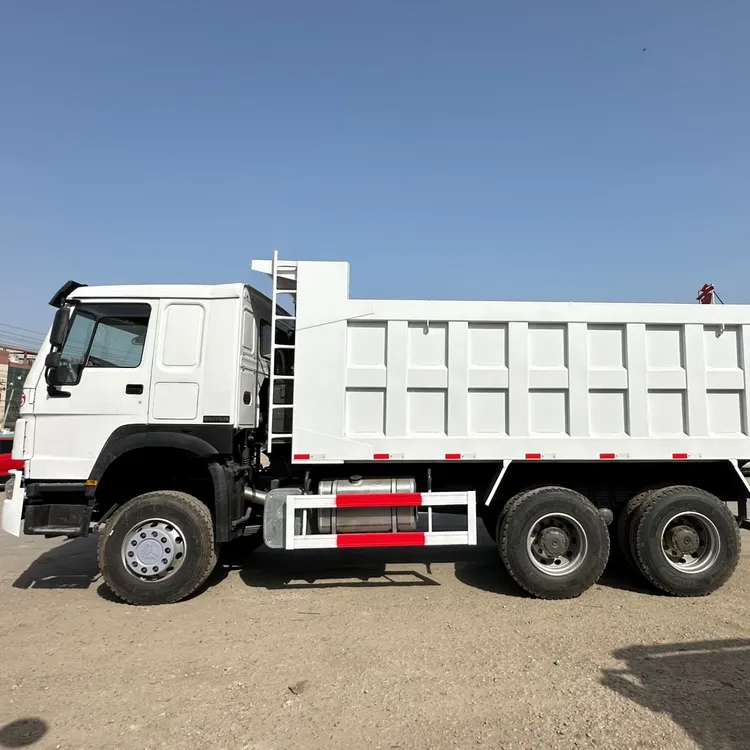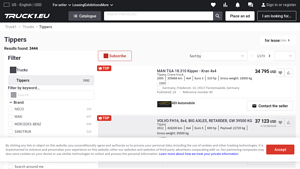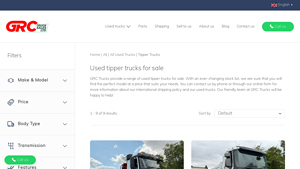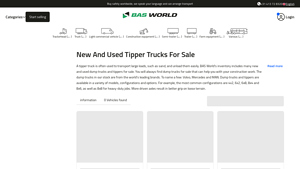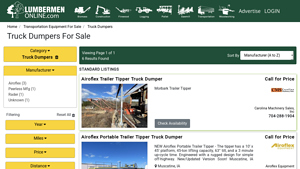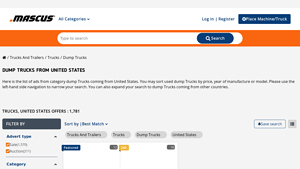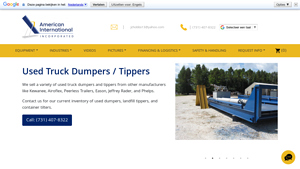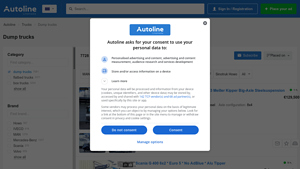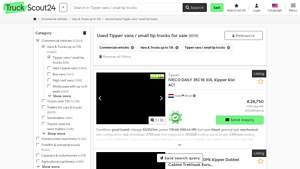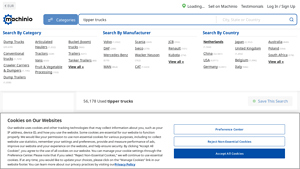Introduction: Navigating the Global Market for used Tipper Truck
In the dynamic landscape of global commerce, sourcing reliable used tipper trucks presents a significant challenge for B2B buyers, especially those operating in the construction and mining sectors across Africa, South America, the Middle East, and Europe. With the demand for efficient transportation of bulk materials on the rise, understanding the nuances of the used tipper truck market is essential. This guide aims to equip international buyers with comprehensive insights into the various types of tipper trucks, their applications, and the critical factors to consider when selecting a supplier.
Throughout this guide, we will delve into the diverse range of used tipper trucks available, from compact models suitable for urban construction to heavy-duty vehicles designed for rugged terrains. We will also address essential aspects such as cost considerations, supplier vetting processes, and the importance of regulatory compliance in different regions. By providing actionable insights and expert recommendations, this guide empowers B2B buyers to make informed purchasing decisions, ensuring they acquire the right equipment to meet their operational needs.
Whether you are based in Nigeria, Saudi Arabia, or any other region, navigating the complexities of the used tipper truck market can be streamlined with the right knowledge and resources. Let this guide be your trusted companion as you embark on your journey to secure reliable, high-performance trucks that enhance productivity and drive business success.
Understanding used Tipper Truck Types and Variations
| Type Name | Key Distinguishing Features | Primary B2B Applications | Brief Pros & Cons for Buyers |
|---|---|---|---|
| Standard Tipper | Open-top body, hydraulic lift, usually 4×2 or 6×4 configurations | Construction, waste management | Pros: Versatile, cost-effective; Cons: Limited payload capacity compared to larger models. |
| Articulated Tipper | Flexible joint between truck and trailer, higher payload capacity | Heavy construction, mining | Pros: High load capacity; Cons: More complex to maneuver, requires skilled operators. |
| 8×4 Tipper | Four axles for enhanced stability and load distribution | Bulk material transport, infrastructure | Pros: Greater stability and payload; Cons: Higher operational costs due to maintenance. |
| Drop-side Tipper | Sides that drop down for easy loading/unloading | Agriculture, landscaping | Pros: Easy access for loading; Cons: Less secure for loose materials. |
| Tipper with Grab | Equipped with a grabber for handling bulk materials | Recycling, demolition | Pros: Multi-functional; Cons: Higher initial investment and maintenance. |
What are the Characteristics and Suitability of Standard Tipper Trucks?
Standard tipper trucks are characterized by their open-top bodies and hydraulic lifting mechanisms. Typically available in 4×2 or 6×4 configurations, they are designed to transport loose materials like sand, gravel, and soil. Their versatility makes them ideal for construction sites and waste management tasks. When purchasing, buyers should consider the truck’s payload capacity and overall condition, as these factors directly impact operational efficiency.
How Do Articulated Tipper Trucks Function in Heavy Applications?
Articulated tipper trucks feature a flexible joint between the truck and its trailer, allowing for a higher payload capacity, often exceeding 30 tonnes. This design is particularly beneficial in heavy construction and mining applications where transporting large quantities of materials is essential. Buyers should assess the complexity of operation and maintenance requirements, as these trucks demand skilled operators and can incur higher upkeep costs.
What Makes 8×4 Tipper Trucks Ideal for Bulk Material Transport?
The 8×4 tipper truck, with its four axles, offers enhanced stability and superior load distribution, making it well-suited for bulk material transport and infrastructure projects. These trucks typically handle heavier payloads, providing a competitive edge in demanding environments. However, potential buyers should be aware of the increased operational costs associated with maintenance and fuel consumption.
Why Choose Drop-side Tipper Trucks for Agriculture and Landscaping?
Drop-side tipper trucks are distinguished by their sides that can be lowered for easy access during loading and unloading. These trucks are commonly used in agricultural and landscaping applications, where quick and efficient material handling is crucial. While they provide easy access, buyers should consider the trade-off in security for loose materials, as the open sides can lead to spillage during transport.
What Advantages Do Tipper Trucks with Grabs Offer for Recycling and Demolition?
Tipper trucks equipped with grabs are designed to handle bulk materials efficiently, making them ideal for recycling and demolition projects. The grabber allows for easy collection and unloading of materials, enhancing operational efficiency. However, buyers should weigh the higher initial investment and maintenance costs against the increased functionality and versatility these trucks provide in specialized applications.
Key Industrial Applications of used Tipper Truck
| Industry/Sector | Specific Application of used Tipper Truck | Value/Benefit for the Business | Key Sourcing Considerations for this Application |
|---|---|---|---|
| Construction | Transporting aggregate materials for building sites | Efficient material handling and reduced labor costs | Ensure truck capacity matches project scale; consider terrain capabilities |
| Mining | Hauling ores and minerals from extraction sites | Maximizes productivity in harsh environments | Look for trucks with heavy-duty chassis and off-road capabilities |
| Agriculture | Moving soil, fertilizers, and crops | Enhances farm productivity and operational efficiency | Assess payload capacity and compatibility with farming equipment |
| Waste Management | Collecting and transporting debris and recyclables | Streamlines waste disposal processes | Choose trucks with robust tipping mechanisms for easy unloading |
| Infrastructure Development | Delivering construction materials for roadworks | Supports timely project completion | Verify compliance with local regulations and road conditions |
How Are Used Tipper Trucks Utilized in the Construction Sector?
In the construction industry, used tipper trucks are essential for transporting aggregate materials like gravel, sand, and concrete from supply sites to construction locations. Their open-top design and hydraulic tipping mechanism allow for quick and efficient unloading, minimizing downtime and labor costs. International buyers should consider the truck’s payload capacity and ensure it can handle the specific materials involved in their projects. Additionally, the ability to navigate various terrains is crucial, especially in regions with undeveloped infrastructure.
What Role Do Used Tipper Trucks Play in Mining Operations?
In mining, used tipper trucks are utilized to transport ores and minerals from extraction sites to processing facilities. Their heavy-duty construction and high payload capacities make them ideal for the harsh conditions often encountered in mining environments. Buyers from regions like Africa and South America should prioritize trucks with off-road capabilities and robust chassis to ensure reliability. Moreover, considering the truck’s maintenance history can provide insights into its durability and performance under challenging conditions.
How Are Used Tipper Trucks Beneficial in Agriculture?
Agricultural operations frequently employ used tipper trucks for moving soil, fertilizers, and harvested crops. These trucks significantly enhance productivity by allowing farmers to efficiently transport bulk materials across fields. Buyers should look for models with appropriate payload capacities and features that facilitate compatibility with other farming equipment. For regions with rough terrains, selecting trucks designed for off-road use can help mitigate potential challenges during transportation.
In What Ways Are Used Tipper Trucks Essential for Waste Management?
Used tipper trucks are crucial in waste management for collecting and transporting debris, recyclables, and construction waste. Their efficient unloading capabilities streamline the waste disposal process, making them a valuable asset for municipalities and waste management companies. When sourcing these trucks, buyers should focus on models with strong tipping mechanisms and durable bodies that can withstand the rigors of waste transport. Additionally, understanding local regulations regarding waste disposal can guide selection to ensure compliance.
How Do Used Tipper Trucks Support Infrastructure Development?
In infrastructure development, used tipper trucks are vital for delivering construction materials like asphalt, gravel, and concrete to roadworks. Their ability to quickly unload materials supports timely project completion, which is critical in competitive markets. Buyers should verify that the trucks meet local regulations and can handle the road conditions typical in their region. Furthermore, assessing the truck’s fuel efficiency and maintenance history can lead to long-term cost savings in operational expenditures.
3 Common User Pain Points for ‘used Tipper Truck’ & Their Solutions
Scenario 1: Difficulty in Finding the Right Specifications for Specific Projects
The Problem: Many B2B buyers face the challenge of selecting a used tipper truck that meets specific project requirements. For example, a construction company in Nigeria might need a truck with a particular payload capacity, engine type, or features suited for rough terrain. The vast array of options available can be overwhelming, leading to potential mismatches that could result in operational inefficiencies and increased costs.
The Solution: To address this challenge, it is crucial for buyers to conduct thorough research before making a purchase. Start by clearly defining your project requirements, including the type of materials to be transported, the weight limits, and the type of terrain the truck will operate on. Utilize online platforms and marketplaces that allow filtering based on these specifications. Engaging with reputable suppliers who can provide detailed information about their inventory, including performance metrics and condition reports, is also beneficial. Additionally, consider seeking expert advice from industry professionals to ensure you select a truck that aligns perfectly with your operational needs.
Scenario 2: Concerns Over Vehicle Condition and Reliability
The Problem: The condition of used tipper trucks can be a major concern for buyers. Many potential purchasers worry about the reliability of pre-owned vehicles, fearing hidden defects or insufficient maintenance history that could lead to unexpected downtime. For example, a mining operation in South America may require continuous operation, and any breakdowns could significantly affect productivity and profits.
The Solution: To mitigate concerns about reliability, buyers should prioritize purchasing from established dealers known for their integrity and thorough inspection processes. Always request a comprehensive vehicle history report and maintenance records to gauge the truck’s reliability. Conducting an independent inspection before finalizing the purchase can also provide peace of mind. Furthermore, consider opting for trucks that come with warranties or service agreements, which can help cover potential repairs and maintenance costs, thereby ensuring operational continuity.
Scenario 3: Complications with Exporting and Logistics
The Problem: For international buyers, especially from regions like Africa and the Middle East, navigating the complexities of exporting a used tipper truck can be daunting. Issues such as understanding customs regulations, shipping logistics, and ensuring compliance with local vehicle standards can create significant hurdles, leading to delays and increased costs.
The Solution: To simplify the export process, it is essential to partner with suppliers who have experience in international shipping and are familiar with the relevant regulations. Look for dealers who offer comprehensive export services, including handling documentation, customs clearance, and logistics coordination. Before committing to a purchase, inquire about the dealer’s shipping capabilities and their experience with the destination country’s regulations. Additionally, consider working with a logistics company that specializes in heavy equipment transportation, as they can provide tailored solutions to ensure timely and compliant delivery to your desired location. This proactive approach will streamline the process and minimize potential complications associated with international purchases.
Strategic Material Selection Guide for used Tipper Truck
What Are the Key Materials Used in Tipper Trucks and Their Properties?
When selecting a used tipper truck, understanding the materials used in its construction is crucial for ensuring performance, durability, and cost-effectiveness. The most common materials include steel, aluminum, composite materials, and reinforced plastics. Each material has unique properties that can significantly impact the truck’s performance and suitability for various applications.
How Does Steel Contribute to Tipper Truck Performance?
Key Properties: Steel is known for its high tensile strength and durability, making it an excellent choice for heavy-duty applications. It can withstand high pressure and temperature fluctuations, ensuring reliability under challenging conditions.
Pros & Cons: The primary advantage of steel is its durability and resistance to wear and tear, which is essential for construction and mining applications. However, it is heavier than other materials, which can affect fuel efficiency. Additionally, steel is prone to corrosion if not properly treated, leading to increased maintenance costs.
Impact on Application: Steel’s strength makes it suitable for transporting heavy materials like gravel, sand, and construction debris. However, its weight can limit payload capacity, which is a critical consideration for international buyers looking to maximize efficiency.
Considerations for International Buyers: Compliance with international standards such as ASTM or DIN is essential when sourcing steel components. Buyers from regions like Africa and the Middle East should also consider the local availability of corrosion-resistant coatings to mitigate maintenance challenges.
What Role Does Aluminum Play in Tipper Truck Design?
Key Properties: Aluminum is lightweight yet strong, offering excellent corrosion resistance. It performs well in various environmental conditions, making it a popular choice for truck bodies.
Pros & Cons: The key advantage of aluminum is its weight, which allows for increased payload capacity and improved fuel efficiency. However, it is generally more expensive than steel and can be less durable under extreme conditions, such as heavy impacts.
Impact on Application: Aluminum is ideal for applications requiring lighter loads, such as transporting agricultural products or lighter construction materials. Its resistance to rust makes it suitable for humid or coastal environments.
Considerations for International Buyers: Buyers should ensure that aluminum components meet local and international standards to guarantee performance. In regions like South America, where humidity can be high, aluminum’s corrosion resistance is particularly beneficial.
How Do Composite Materials Enhance Tipper Truck Functionality?
Key Properties: Composite materials combine different substances to create a lightweight, strong, and corrosion-resistant product. They can be engineered to meet specific performance requirements.
Pros & Cons: Composites offer the advantage of reduced weight and enhanced resistance to environmental factors. However, they can be more expensive to manufacture and may require specialized repair techniques.
Impact on Application: Composites are suitable for specialized applications, such as transporting chemicals or materials that require non-reactive surfaces. Their lightweight nature can help improve fuel efficiency.
Considerations for International Buyers: Buyers should verify that composite materials comply with industry standards. In regions like Europe, where environmental regulations are stringent, using composites can help meet compliance requirements.
What Are the Benefits of Reinforced Plastics in Tipper Trucks?
Key Properties: Reinforced plastics are lightweight, corrosion-resistant, and can be molded into complex shapes. They are often used in applications where traditional materials may fail.
Pros & Cons: The primary advantage of reinforced plastics is their resistance to corrosion and chemicals, making them suitable for various applications. However, they may not offer the same level of structural integrity as metals, which can be a limitation in heavy-duty scenarios.
Impact on Application: Reinforced plastics are ideal for transporting corrosive materials or in applications where weight savings are critical. However, their use may be limited in heavy construction environments.
Considerations for International Buyers: International buyers should ensure that reinforced plastics meet relevant standards for strength and durability. In regions like Africa, where the infrastructure may be less developed, the robustness of materials is crucial for operational reliability.
Summary Table of Material Properties for Used Tipper Trucks
| Material | Typical Use Case for used Tipper Truck | Key Advantage | Key Disadvantage/Limitation | Relative Cost (Low/Med/High) |
|---|---|---|---|---|
| Steel | Heavy-duty transport of construction materials | High durability and strength | Heavier weight affecting fuel efficiency | Medium |
| Aluminum | Transporting lighter loads and agricultural products | Lightweight, improved fuel efficiency | More expensive and less impact-resistant | High |
| Composite | Specialized transport (e.g., chemicals) | Lightweight, customizable performance | Higher manufacturing costs | High |
| Reinforced Plastics | Transporting corrosive materials | Corrosion-resistant, lightweight | Limited structural integrity | Medium |
This strategic material selection guide provides valuable insights for international B2B buyers, enabling them to make informed decisions when purchasing used tipper trucks. Understanding the properties, advantages, and limitations of these materials is essential for optimizing performance and ensuring compliance with local standards.
In-depth Look: Manufacturing Processes and Quality Assurance for used Tipper Truck
What Are the Key Stages in the Manufacturing Process of Used Tipper Trucks?
The manufacturing process of used tipper trucks involves several critical stages, ensuring that each vehicle is robust and capable of meeting the demands of heavy-duty applications. Understanding these stages is essential for B2B buyers looking to procure reliable machinery.
-
Material Preparation: The process begins with the selection of high-grade materials, such as high-strength steel, which are essential for the truck’s durability. Manufacturers often source materials from reputable suppliers, ensuring compliance with international standards. The materials are subjected to various treatments to enhance their strength and resistance to wear.
-
Forming: In this stage, the prepared materials undergo various forming processes, including cutting, bending, and welding. Advanced techniques like laser cutting and robotic welding are frequently used to achieve precision. For tipper trucks, forming the chassis and body is crucial as it dictates the vehicle’s ability to carry heavy loads and withstand harsh operating conditions.
-
Assembly: After forming, components are assembled into the truck’s structure. This stage includes the integration of the engine, transmission, and hydraulic systems, which are vital for the tipping functionality. Skilled technicians oversee this phase to ensure that every part is correctly fitted and aligned, minimizing the risk of mechanical failure during operation.
-
Finishing: The final stage involves painting and applying protective coatings to the truck. This not only enhances the vehicle’s aesthetic appeal but also provides corrosion resistance, which is particularly important for trucks operating in diverse climates. Quality checks during this phase ensure that the finish meets both aesthetic and functional requirements.
What Quality Control Measures Are Commonly Used in Tipper Truck Manufacturing?
Quality assurance is paramount in the manufacturing of used tipper trucks, ensuring that each vehicle meets stringent performance and safety standards. International standards like ISO 9001 play a vital role in guiding quality management processes, while industry-specific certifications, such as CE marking in Europe, validate compliance with safety regulations.
-
Incoming Quality Control (IQC): This initial checkpoint involves inspecting raw materials and components upon delivery. Suppliers must provide documentation, including certificates of compliance, to verify that materials meet required specifications. Regular audits of suppliers help maintain quality standards.
-
In-Process Quality Control (IPQC): Throughout the manufacturing process, IPQC checkpoints are established to monitor various stages of production. This includes examining welds, ensuring proper assembly, and testing hydraulic systems. Using statistical process control techniques, manufacturers can identify and rectify issues before they escalate.
-
Final Quality Control (FQC): Once the truck is fully assembled, it undergoes rigorous testing to ensure that all systems function correctly. This includes road tests to assess performance under load and inspections to verify compliance with safety standards. Documentation of these tests provides buyers with assurance of the truck’s reliability.
How Can B2B Buyers Verify the Quality Control Processes of Tipper Truck Manufacturers?
For B2B buyers, particularly those from regions such as Africa, South America, the Middle East, and Europe, verifying a supplier’s quality control processes is critical to ensuring a successful procurement. Here are several strategies to consider:
-
Supplier Audits: Conducting on-site audits of potential suppliers allows buyers to directly assess their quality management systems. This includes reviewing documentation related to IQC, IPQC, and FQC processes, as well as evaluating the equipment and technology used in manufacturing.
-
Requesting Quality Reports: Buyers should request detailed quality reports that outline the testing methods used, results of previous inspections, and compliance with international standards. A transparent supplier will readily provide this information, demonstrating their commitment to quality.
-
Third-Party Inspections: Engaging third-party inspection services can provide an unbiased evaluation of the supplier’s quality control measures. These services often conduct detailed inspections during the manufacturing process and can certify that the trucks meet specified standards before shipment.
What Are the Quality Certification Nuances for International B2B Buyers?
When sourcing used tipper trucks for international markets, buyers must navigate various certification requirements that can differ by region:
-
Understanding Regional Standards: Different regions may have specific regulations regarding vehicle emissions, safety, and operational standards. For example, trucks exported to the European Union must comply with Euro emission standards, while those sent to Africa may have different criteria.
-
Documentation Requirements: Ensuring that all necessary documentation, including certificates of origin, compliance certificates, and customs paperwork, is in order is crucial. This can prevent delays at ports and ensure a smooth import process.
-
Local Compliance: Buyers should also be aware of local regulations in their country of operation. For instance, some countries may require additional inspections or modifications to vehicles before they can be registered for use. Suppliers should be able to assist with these requirements to facilitate the import process.
Conclusion: Making Informed Decisions in the Tipper Truck Market
Understanding the manufacturing processes and quality assurance measures for used tipper trucks is essential for B2B buyers looking to invest wisely. By familiarizing themselves with the key stages of production, quality control checkpoints, and certification nuances, buyers can ensure they procure vehicles that meet their operational needs and comply with international standards. This knowledge empowers businesses to make informed decisions, ultimately leading to successful procurement and enhanced operational efficiency.
Practical Sourcing Guide: A Step-by-Step Checklist for ‘used Tipper Truck’
Introduction
This guide serves as a comprehensive checklist for international B2B buyers seeking to procure used tipper trucks. Understanding the intricacies of sourcing these vehicles is vital for making informed decisions that can impact operational efficiency and profitability. This step-by-step approach will help you navigate the procurement process effectively.
Step 1: Define Your Technical Specifications
Establishing clear technical specifications is the first step in your sourcing journey. Consider factors such as load capacity, engine power, and the type of materials you will transport. For instance, different models cater to varying payloads, with smaller trucks handling around 14-16 tonnes and larger articulated trucks capable of over 44 tonnes.
Step 2: Research Market Prices and Trends
Before making a purchase, it’s essential to understand the current market prices for used tipper trucks. This knowledge enables you to identify competitive offers and avoid overpaying. Utilize online platforms and auction sites to compare prices across different brands and models, taking note of any seasonal trends that may affect pricing.
Step 3: Evaluate Potential Suppliers
Thoroughly vet potential suppliers to ensure reliability and quality. Request documentation such as company profiles, case studies, and references from past buyers, especially those within your industry. Look for suppliers with a solid track record in international shipping, as this will simplify logistics and reduce potential delays.
- Check for Certifications: Ensure suppliers have necessary certifications for vehicle quality and safety standards.
- Assess Customer Reviews: Examine feedback from previous clients to gauge satisfaction and service reliability.
Step 4: Inspect Vehicles Thoroughly
Once you shortlist potential trucks, conduct a thorough inspection. If possible, arrange for a physical inspection or request detailed photographs and service records. Pay attention to:
- Mechanical Condition: Check for signs of wear and tear, especially in the engine and transmission.
- Body Integrity: Inspect the chassis and tipping mechanism for structural damage or rust.
Step 5: Understand Export Regulations and Shipping Options
Familiarize yourself with the export regulations of your country and the shipping requirements from the supplier’s location. This step is crucial to avoid unexpected customs issues or additional costs. Look for suppliers who can assist with documentation and offer competitive shipping rates to your desired destination.
Step 6: Negotiate Terms and Finalize the Purchase
Once you’ve completed your due diligence, it’s time to negotiate terms. Discuss payment options, warranty provisions, and return policies. A well-structured contract should cover all aspects of the transaction, including shipping timelines and liability in case of defects.
Step 7: Arrange for Post-Purchase Support
After acquiring your used tipper truck, ensure you have access to ongoing support. This includes maintenance services, parts availability, and technical assistance. A supplier that offers comprehensive after-sales support can significantly enhance your operational efficiency and extend the lifespan of your vehicle.
By following this checklist, you can streamline the procurement process for used tipper trucks, ensuring that your investment aligns with your business needs and operational goals.
Comprehensive Cost and Pricing Analysis for used Tipper Truck Sourcing
What Are the Key Cost Components for Sourcing Used Tipper Trucks?
When sourcing used tipper trucks, understanding the cost structure is essential for making informed purchasing decisions. The primary cost components include materials, labor, manufacturing overhead, tooling, quality control (QC), logistics, and supplier margin.
-
Materials: The composition of the truck, including the chassis, body, and engine components, significantly influences costs. High-quality materials that are durable and resistant to wear, especially in rugged environments, will typically raise the price.
-
Labor: Labor costs encompass not only the assembly of the truck but also the expertise involved in refurbishing used models. Skilled labor can drive costs up, particularly if specialized maintenance or repairs are required.
-
Manufacturing Overhead: This includes indirect costs associated with production, such as utilities and facility maintenance. For used trucks, the overhead may be lower, but refurbishment and inspections may add to these costs.
-
Tooling: While less relevant for used trucks compared to new manufacturing, any specialized tools needed for repairs or enhancements can impact the final cost.
-
Quality Control (QC): Ensuring that the truck meets safety and operational standards involves thorough inspections, which can add to the overall cost. Certification processes may also be required, especially for international buyers.
-
Logistics: Transportation and shipping costs are significant, particularly for international buyers. Factors such as distance, mode of transport, and customs fees contribute to this component.
-
Margin: Suppliers will add a profit margin based on their costs and market conditions. Understanding the supplier’s margin can help buyers negotiate better prices.
What Influences the Pricing of Used Tipper Trucks in B2B Transactions?
Several factors influence the pricing of used tipper trucks, making it crucial for buyers to consider these when negotiating.
-
Volume/MOQ: Bulk purchases often lead to discounts. Suppliers may offer better pricing to buyers willing to commit to larger orders.
-
Specifications and Customization: Trucks with specific features or customizations will generally cost more. Buyers should assess their needs against available inventory to avoid overpaying for unnecessary features.
-
Materials and Quality Certifications: Trucks built with high-grade materials or those with certifications (e.g., Euro 6 emissions standards) may command higher prices. Buyers should weigh the benefits of such quality against the cost.
-
Supplier Factors: Reputation, experience, and geographical location of suppliers can affect pricing. Established suppliers may charge a premium for reliability and quality assurance.
-
Incoterms: The agreed-upon Incoterms define the responsibilities of buyers and sellers regarding shipping, insurance, and tariffs. Understanding these can help avoid unexpected costs.
What Are Effective Buyer Tips for Sourcing Used Tipper Trucks?
To navigate the complexities of purchasing used tipper trucks, buyers should consider these tips:
-
Negotiation: Engage in discussions with suppliers to explore potential discounts or payment terms. Understanding the cost structure can provide leverage in negotiations.
-
Cost-Efficiency: Analyze the total cost of ownership (TCO), which includes purchase price, maintenance, fuel, and operational costs. A cheaper upfront price may not always lead to savings in the long run.
-
International Pricing Nuances: Buyers from regions such as Africa, South America, the Middle East, and Europe should be aware of additional costs such as import duties, taxes, and compliance with local regulations. These can significantly affect the final price.
-
Documentation and Inspection: Ensure that all necessary documentation (e.g., ownership, maintenance records) is available and consider arranging an independent inspection. This helps in assessing the true condition of the vehicle and avoiding future costs.
Disclaimer on Pricing
Prices for used tipper trucks can vary widely based on condition, specifications, and market demand. The figures mentioned in various listings may serve as indicative prices but are subject to change. Buyers are encouraged to conduct thorough research and engage in direct discussions with suppliers to obtain the most accurate and current pricing information.
Alternatives Analysis: Comparing used Tipper Truck With Other Solutions
Introduction to Alternative Solutions for Material Transport
When considering the logistics of transporting bulk materials, businesses often look for the most efficient and cost-effective solutions. While used tipper trucks are a popular choice in industries such as construction and mining, there are alternative methods that may better suit specific operational needs. Understanding these alternatives can help B2B buyers make informed decisions based on performance, cost, and operational efficiency.
Comparison Table
| Comparison Aspect | Used Tipper Truck | Rigid Body Truck | Conveyor Belt System |
|---|---|---|---|
| Performance | High load capacity; versatile for various materials | Moderate load capacity; limited to specific materials | Continuous material flow; high efficiency for specific uses |
| Cost | Moderate initial investment; ongoing maintenance required | Lower initial investment; lower maintenance | High initial investment; low ongoing costs |
| Ease of Implementation | Quick setup; driver training required | Quick setup; minimal training | Complex installation; requires skilled personnel |
| Maintenance | Regular servicing needed; parts can be costly | Relatively low maintenance | Low maintenance; requires infrequent repairs |
| Best Use Case | Construction, mining, and waste management | Local deliveries and construction sites | Manufacturing plants and large-scale material handling |
Detailed Breakdown of Alternatives
Rigid Body Truck
Rigid body trucks serve as a viable alternative to used tipper trucks, particularly for businesses focused on local deliveries. These trucks offer moderate load capacities and are well-suited for transporting specific materials such as concrete or aggregates. The initial investment is typically lower than that of a used tipper truck, making it attractive for smaller businesses or those with limited budgets. However, the performance is not as versatile, and these trucks may not be as effective for off-road conditions.
Conveyor Belt System
For operations that require a continuous flow of materials, conveyor belt systems are an excellent alternative. These systems excel in manufacturing plants and large-scale material handling environments, providing high efficiency and low operational costs over time. However, the initial investment for a conveyor system can be substantial, and its complexity may require skilled personnel for installation and operation. This makes it less suitable for businesses that need immediate and flexible transport solutions.
Conclusion: How to Choose the Right Solution for Your Business Needs
Selecting the right transport solution for bulk materials depends on various factors, including operational needs, budget, and the type of materials being handled. Used tipper trucks offer significant versatility and are ideal for construction and mining applications, while rigid body trucks may serve better for local deliveries. Conveyor belt systems, although costly to implement, can provide unmatched efficiency in specific settings. B2B buyers should evaluate their specific requirements, including load capacity, maintenance capabilities, and the nature of the materials to determine which solution aligns best with their business objectives.
Essential Technical Properties and Trade Terminology for used Tipper Truck
What Are the Key Technical Properties of Used Tipper Trucks?
Understanding the technical specifications of used tipper trucks is crucial for B2B buyers in industries such as construction, mining, and waste management. Here are some essential properties to consider:
-
Payload Capacity
This refers to the maximum weight a tipper truck can carry, typically measured in tonnes. Payload capacities can range from 14 tonnes for smaller models to 44 tonnes for articulated trucks. Knowing the payload capacity is vital for buyers to ensure that the truck meets their transport needs without exceeding legal weight limits, which can lead to fines and operational delays. -
Chassis Configuration
Tipper trucks come in various chassis configurations, such as 4×2, 6×4, and 8×4. The configuration determines the vehicle’s stability, manoeuvrability, and overall load-bearing capacity. For example, an 8×4 configuration is often preferred for heavy-duty applications due to its enhanced stability and ability to handle larger payloads. Buyers must choose a configuration that aligns with their specific operational requirements. -
Engine Power (BHP)
Engine power is measured in Brake Horsepower (BHP) and indicates the truck’s capability to perform under heavy loads. Common BHP ratings for used tipper trucks range from 250 to 600 BHP. Higher BHP is essential for applications involving steep terrains or carrying maximum payloads, enabling efficient and safe operation. Buyers should assess the engine power in relation to their specific operational demands. -
Transmission Type
Tipper trucks may feature either manual or automatic transmissions. Automatic transmissions are easier to operate and are often preferred in urban settings, while manual transmissions may offer better control in off-road conditions. Understanding the transmission type can influence driver efficiency and maintenance costs, making it an important consideration for fleet managers. -
Body Material and Design
The body of a tipper truck is typically made from steel or aluminum, with each material offering distinct advantages. Steel is more robust and suitable for heavy-duty applications, while aluminum is lighter and can enhance fuel efficiency. The design of the tipping body also affects the truck’s versatility; options include standard tipping, three-way tipping, or specialized designs for specific materials. -
Suspension System
The suspension system impacts the truck’s ride quality and load handling. Options include leaf spring and air suspension, with air suspension providing better ride comfort and load distribution. Understanding the suspension type is crucial for buyers who operate in rugged terrains or plan to transport delicate materials.
What Are Common Trade Terminology Terms Related to Used Tipper Trucks?
Familiarity with industry jargon can enhance communication and negotiation with suppliers. Here are several key terms to know:
-
OEM (Original Equipment Manufacturer)
This term refers to the company that produces the original components used in the manufacturing of a vehicle. For buyers, understanding OEM specifications ensures that any parts or replacements maintain the quality and compatibility of the original truck design. -
MOQ (Minimum Order Quantity)
MOQ is the smallest number of units a supplier is willing to sell. This term is particularly important for bulk buyers looking to negotiate prices or secure a consistent supply of used tipper trucks. Knowing the MOQ can help buyers plan their purchases effectively. -
RFQ (Request for Quotation)
An RFQ is a document sent to suppliers to request pricing and terms for specific products or services. For B2B buyers, submitting an RFQ is a critical step in the procurement process, as it allows for comparison of offers and ensures transparency in pricing. -
Incoterms (International Commercial Terms)
These are standardized trade terms that define the responsibilities of buyers and sellers in international transactions. Understanding Incoterms is essential for buyers involved in cross-border purchases, as they clarify shipping costs, risk, and delivery obligations. -
TCO (Total Cost of Ownership)
TCO encompasses all costs associated with acquiring and operating a vehicle over its lifetime, including purchase price, maintenance, fuel, and depreciation. For B2B buyers, evaluating TCO is crucial for determining the long-term value of a used tipper truck. -
Warranty
A warranty is a guarantee provided by the seller regarding the condition and performance of the truck. Understanding warranty terms can protect buyers from unforeseen repair costs and provide assurance of the vehicle’s reliability.
By grasping these technical properties and trade terms, B2B buyers can make informed decisions when purchasing used tipper trucks, ultimately leading to more successful operations and better investment returns.
Navigating Market Dynamics and Sourcing Trends in the used Tipper Truck Sector
What Are the Current Market Dynamics and Key Trends in the Used Tipper Truck Sector?
The used tipper truck market is witnessing significant growth, driven by increasing demand in sectors such as construction, mining, and agriculture. Global urbanization and infrastructure development, particularly in Africa, South America, and the Middle East, are key drivers. As these regions expand, the need for reliable heavy-duty vehicles that can transport bulk materials efficiently becomes paramount. Furthermore, international B2B buyers are increasingly leveraging digital platforms to source used vehicles, enhancing transparency and accessibility.
Emerging technologies, such as telematics and fleet management systems, are reshaping sourcing strategies. These innovations provide real-time data on vehicle performance and maintenance needs, enabling buyers to make informed purchasing decisions. The shift towards online marketplaces has also streamlined the buying process, allowing companies to compare prices and specifications from various suppliers, thereby fostering competitive pricing.
In Europe, there is a trend towards more fuel-efficient and environmentally friendly options, pushing manufacturers to offer trucks that meet stringent emissions standards. In contrast, African and South American markets may prioritize cost-effective solutions, focusing on durability and availability of spare parts. Understanding these regional nuances is essential for international buyers to navigate the market effectively.
How Is Sustainability and Ethical Sourcing Impacting the Used Tipper Truck Sector?
Sustainability is increasingly becoming a cornerstone of B2B purchasing decisions in the used tipper truck sector. The environmental impact of heavy-duty vehicles, including emissions and fuel consumption, is under scrutiny. Buyers are now more inclined to choose trucks that are not only reliable but also environmentally friendly, seeking out models with better fuel efficiency and lower emissions.
Ethical sourcing plays a vital role in this landscape. Companies are expected to ensure that their supply chains adhere to environmental standards and labor rights. This includes sourcing used trucks from reputable dealers who comply with regulations regarding the disposal and recycling of vehicle parts. Certifications such as ISO 14001 for environmental management can be critical in assuring buyers of a supplier’s commitment to sustainability.
Furthermore, the adoption of ‘green’ certifications for used vehicles, which validate their eco-friendliness, is gaining traction. Buyers are encouraged to inquire about the environmental impact of their purchases and seek out suppliers who prioritize sustainable practices, thus contributing to a more responsible industry.
What Is the Historical Context of the Used Tipper Truck Market?
The used tipper truck market has evolved significantly over the past few decades. Initially dominated by local manufacturers, the sector has seen a surge in globalization, allowing international brands to enter various markets. The advent of online platforms has revolutionized the way buyers access used vehicles, making it easier to compare options and prices across borders.
In the 1990s and early 2000s, the focus was primarily on the functionality and durability of trucks. However, as environmental concerns gained prominence, manufacturers began to innovate, introducing models that met stricter emissions standards and offered better fuel efficiency. Today, the market is characterized by a blend of traditional values—such as reliability and cost-effectiveness—alongside a growing emphasis on sustainability and ethical sourcing.
This historical progression highlights the need for international B2B buyers to remain adaptable, keeping abreast of technological advancements and changing consumer expectations as they navigate the complexities of sourcing used tipper trucks.
Frequently Asked Questions (FAQs) for B2B Buyers of used Tipper Truck
-
How do I ensure the quality of a used tipper truck before purchase?
To ensure the quality of a used tipper truck, start by requesting a comprehensive inspection report from the seller. This report should include details about the truck’s mechanical condition, mileage, and any previous accidents or repairs. Additionally, consider arranging a pre-purchase inspection by a certified mechanic to assess the truck’s condition firsthand. It’s also advisable to review service history records and confirm the authenticity of the truck’s documentation to ensure it meets international standards. -
What are the key factors to consider when selecting a used tipper truck for my business?
When selecting a used tipper truck, consider factors such as payload capacity, engine power, and overall condition. Assess whether the truck’s specifications align with your operational needs, including the types of materials you’ll be transporting. Additionally, evaluate the truck’s fuel efficiency and maintenance history, as these can significantly impact long-term costs. Brand reputation and availability of spare parts in your region are also critical to ensure reliable operation and support. -
What is the typical price range for used tipper trucks?
The price of used tipper trucks varies significantly based on factors such as age, brand, model, and condition. Generally, you can find used tipper trucks ranging from $10,000 to $50,000 or more. Older models with higher mileage typically cost less, while newer, low-mileage trucks from reputable brands may command higher prices. It’s essential to compare prices from different suppliers and consider the total cost of ownership, including maintenance and operational expenses. -
How can I verify the legitimacy of a supplier when purchasing used tipper trucks?
To verify a supplier’s legitimacy, conduct thorough research by checking online reviews, testimonials, and ratings from previous customers. Request references and follow up with them to gain insights into their experiences. Additionally, verify the supplier’s business credentials, such as registration and compliance with local regulations. Engaging with industry associations and trade organizations can also provide valuable information about the supplier’s reputation. -
What payment terms should I expect when buying used tipper trucks internationally?
Payment terms for international purchases of used tipper trucks can vary by supplier. Common options include full payment upfront, payment on delivery, or a deposit followed by the balance upon receipt. It’s crucial to clarify these terms before proceeding with the transaction and ensure they are documented in a sales agreement. Additionally, consider using secure payment methods, such as letters of credit or escrow services, to mitigate risks associated with international transactions. -
What are the logistics involved in importing used tipper trucks?
Importing used tipper trucks involves several logistical steps, including selecting a shipping method (e.g., container shipping or roll-on/roll-off), arranging for transportation to the port, and ensuring compliance with import regulations in your destination country. You will need to prepare necessary documentation, such as the bill of lading, customs declarations, and import permits. Engaging a freight forwarder can streamline the process, as they can handle shipping logistics and customs clearance on your behalf. -
Can I customize a used tipper truck to meet my specific needs?
Yes, many suppliers offer customization options for used tipper trucks. You can typically request modifications such as changes to the body type, payload capacity, or additional features like hydraulic systems or specialized tipping mechanisms. Before purchasing, discuss your customization needs with the supplier to ensure they can accommodate your requests and provide a clear timeline and cost estimate for the modifications. -
What should I do if the used tipper truck has issues after purchase?
If you encounter issues with a used tipper truck after purchase, first refer to any warranties or guarantees provided by the seller. Document the problems and contact the supplier to discuss potential solutions, which may include repairs or replacements. If the supplier is unresponsive, check local consumer protection laws or seek legal advice to explore your options. Regular maintenance and timely repairs can also help mitigate future issues and extend the truck’s lifespan.
Important Disclaimer & Terms of Use
⚠️ Important Disclaimer
The information provided in this guide, including content regarding manufacturers, technical specifications, and market analysis, is for informational and educational purposes only. It does not constitute professional procurement advice, financial advice, or legal advice.
While we have made every effort to ensure the accuracy and timeliness of the information, we are not responsible for any errors, omissions, or outdated information. Market conditions, company details, and technical standards are subject to change.
B2B buyers must conduct their own independent and thorough due diligence before making any purchasing decisions. This includes contacting suppliers directly, verifying certifications, requesting samples, and seeking professional consultation. The risk of relying on any information in this guide is borne solely by the reader.
Top 9 Used Tipper Truck Manufacturers & Suppliers List
1. Truck1 – Tippers for Sale
Domain: truck1-us.com
Registered: 2016 (9 years)
Introduction: This company, Truck1 – Tippers for Sale, is a notable entity in the market. For specific product details, it is recommended to visit their website directly.
2. GRC Trucks – Used Tipper Trucks for Sale
Domain: grctrucks.com
Registered: 2019 (6 years)
Introduction: Used Tipper Trucks for Sale at GRC Trucks. Key models include:
1. Mercedes Arocs RFE, 2014, 360 BHP, Automatic, Price: £15,950
2. Renault C380, 2014, 380 BHP, Automatic, Price: £12,950
3. MAN TGS 420, 2018, 420 BHP, Automatic, Price: £18,950
4. Scania P 410, 2016, 410 BHP, Automatic, Price: £17,950
5. Scania P 370, 2016, 370 BHP, Automatic, Price: £16,950
6. Volvo FL 6E, 2005, Manual, Price:…
3. Tipper Trucks – New & Used Models
Domain: basworld.com
Registered: 2016 (9 years)
Introduction: Tipper trucks for sale, including new and used models. Common configurations: 4×2, 6×2, 6×4, 8×4, 8×6, and 10×4. Brands include Volvo, Mercedes, MAN, DAF, Scania, and Renault. Options available: one-way, two-way, and three-way tippers, truck-mounted cranes, shut-off valves, and tarpaulins. Suitable for transporting bulk materials like sand, asphalt, and construction debris. Inspected by experts be…
4. Airoflex – Trailer Tipper
Domain: lumbermenonline.com
Registered: 2001 (24 years)
Introduction: [{‘manufacturer’: ‘Airoflex’, ‘model’: ‘Trailer Tipper’, ‘price’: ‘Call for Price’}, {‘manufacturer’: ‘Morbark’, ‘model’: ‘Trailer Tipper’, ‘price’: ‘Call for Price’, ‘contact’: ‘Carolina Machinery Sales, Inc 704-288-1904’}, {‘manufacturer’: ‘Airoflex’, ‘model’: ‘Portable Trailer Tipper’, ‘price’: ‘Call for Price’, ‘features’: ’10’ x 45’ platform, 45-ton lifting capacity, 63° tilt, 3 minute up-cyc…
5. Dump Trucks – Used Listings
Domain: mascus.com
Registered: 2000 (25 years)
Introduction: This company, Dump Trucks – Used Listings, is a notable entity in the market. For specific product details, it is recommended to visit their website directly.
6. AM International – Used Truck Dumpers & Tippers
Domain: aminternationaltnllc.com
Registered: 2012 (13 years)
Introduction: Used Truck Dumpers / Tippers from various manufacturers including Kewanee, Airoflex, Peerless Trailers, Eason, Jeffrey Rader, and Phelps. Product types include Truck Dumpers, Truck Tippers, Wood Chip Dumpers, Wood Shavings Hopper, Container Tilter, and Landfill Tipper. Features include Telescopic Cylinders and Hydraulic Pumping Units. Contact for current inventory and additional information.
7. IVECO – Trakker 440 8×4 Dump Truck for Sale
Domain: autoline.info
Introduction: Dump truck, used dump truck for sale, various brands including IVECO, Mercedes-Benz, and more. Key specifications include:
– IVECO Trakker 440 8×4, 2008 year, 22m³ tipper, BORDMATIK x2, 3-way unloading, priced at €29,000 (≈ $33,810), with 398,000 km mileage.
– New Mercedes-Benz Arocs 4145 8X4, 22m³ Meiller body.
– Axle configurations include 10×4.
– Suspension type: spring/spring.
– Body bran…
8. Tipper Vans – Top Brands Overview
Domain: truckscout24.com
Registered: 2000 (25 years)
Introduction: {“category”:”Tipper vans / small tip trucks”,”total_results”:609,”manufacturers”:[{“name”:”Mercedes-Benz”,”count”:131},{“name”:”Iveco”,”count”:120},{“name”:”Fuso”,”count”:52},{“name”:”Ford”,”count”:43},{“name”:”MAN”,”count”:41},{“name”:”Mitsubishi”,”count”:40},{“name”:”Renault”,”count”:20},{“name”:”Isuzu”,”count”:19},{“name”:”Peugeot”,”count”:19},{“name”:”Opel”,”count”:13},{“name”:”FIAT”,”count”:1…
9. Tipper Trucks – Key Models and Manufacturers
Domain: machinio.com
Registered: 2013 (12 years)
Introduction: Used Tipper Trucks for sale. Key manufacturers include Mack, Ford, International, Chevrolet, and Freightliner. Notable models include 2011 Ford F-750 Chipper Dump Truck, 1995 International 4700 Dump Truck, 2004 Chevrolet C7500 Dump Truck, 2015 Ford F-750 Extended-Cab Chipper Dump Truck, 2008 International 4300 LP Dump Truck, 2016 Ford F750 Chipper Dump Truck, 2009 International 4300 Chipper Dump T…
Strategic Sourcing Conclusion and Outlook for used Tipper Truck
In the realm of used tipper trucks, strategic sourcing emerges as a pivotal factor for international B2B buyers aiming to enhance operational efficiency and cost-effectiveness. Understanding the diverse range of available models, such as those from leading manufacturers like Scania, Mercedes, and Volvo, enables buyers to make informed decisions tailored to their specific needs in sectors like construction, mining, and agriculture. The competitive pricing and extensive inventory of high-quality used trucks allow businesses to save significantly while ensuring reliability and performance.
Moreover, leveraging global shipping options simplifies the procurement process, making it accessible for buyers in regions such as Africa, South America, the Middle East, and Europe. This not only facilitates the acquisition of durable and versatile vehicles but also ensures compliance with necessary documentation and logistics.
As we look to the future, the demand for used tipper trucks is poised to grow, driven by infrastructure development and resource extraction projects worldwide. Now is the time for international B2B buyers to capitalize on these opportunities by engaging with trusted suppliers. Explore the market today to secure the best deals and position your business for success.

